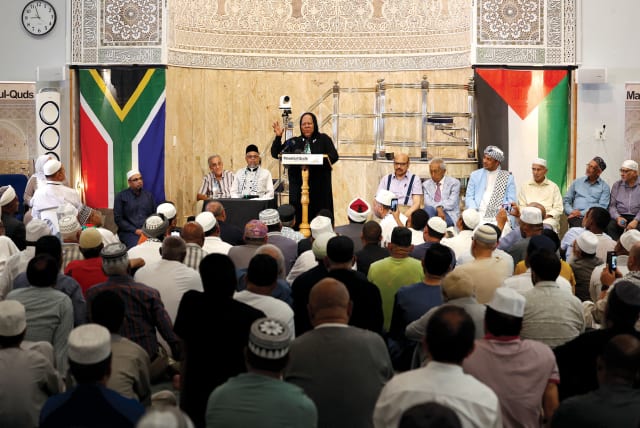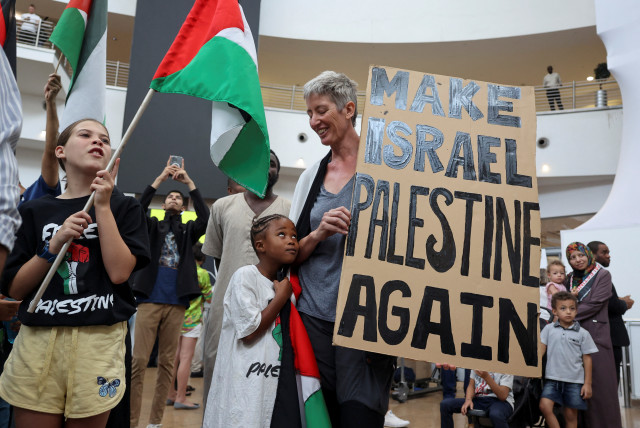How did the world respond to the October 7 massacre? - opinion

The global reaction to these revelations about October 7 has been mixed. While some condemned these acts swiftly, others have been slower to react
The aftermath of the October 7, 2023 attacks in Israel has unfolded a deeply troubling narrative, marked by the brutal use of sexual violence as a weapon of war. This dark chapter, involving Hamas, Palestinian Islamic Jihad, and other groups, left around 1,200 dead and led to the kidnapping of 240 hostages into Gaza. What has emerged from the United Nations Commission of Inquiry’s findings is not just a tale of widespread devastation but a shocking exposé of war crimes, with sexual violence at its grim core.
Imagine a music festival turned into a nightmare scenario, where young attendees faced unimaginable horrors. The Supernova music festival, attended by about 3,500 young people, turned into a site of mass murder and sexual assault, including gang rapes and the desecration of corpses. Then, there’s Road 232, a supposed escape route that instead bore witness to severe wounds and evidence of sexual violence, including signs of rape and mutilation. And in the kibbutzim close to Gaza’s perimeter, such as Re’im, Be’eri, and Kfar Aza, survivors recount tales of rape and sexualized violence.
Even the military wasn’t spared, with reports of sexual violence against both male and female soldiers at the Nahal Oz military base. The horror extended to the hostages taken to Gaza, with firsthand accounts of rape, sexualized torture, and inhumane treatment, painting a grim picture of sexual violence as a deliberate tool of war, meant to terrorize and dehumanize.
The global reaction to these revelations has been mixed. While some condemned these acts swiftly, others have been slower to react, raising questions about the commitment to preventing war crimes and sexual violence in conflict zones. South Africa, in particular, finds itself in a contentious spot. Despite President Cyril Ramaphosa’s condemnation of the Hamas assault, his gestures of solidarity with the Palestinians have sparked debate. Additionally, Minister of International Relations and Cooperation Naledi Pandor’s interactions with Hamas and her visit to Iran and Qatar have drawn criticism, raising concerns over South Africa’s impartiality in the Israeli-Palestinian conflict.
This scenario begs a nuanced, yet forceful global response, especially from South Africa, given its history of siding with Palestinian leaders of the PLO, PLFP, and Hamas, and inviting members of these organizations to South Africa on multiple occasions. In 2015, South Africa welcomed a high-profile visit from Hamas. The delegation was led by Khaled Mashal, then-leader of Hamas, who met with South African president Jacob Zuma and other top officials.
In 2023, South Africa hosted a controversial visit from Hamas and the PFLP, both of which are designated as terrorist organizations by several countries. The delegation from Hamas included Bassem Naim, a member of the Hamas political bureau in the Gaza Strip, and Khaled Qaddoumi, the group’s representative in Iran. The PLFP and its member Leila Khaled have made several visits to South Africa in recent years.
The juxtaposition of condemning violence while showing solidarity with terrorist organizations, and the controversy around Pandor’s actions, places South Africa’s leadership in a negative light.
Among the myriad of reactions, the roles of South Africa’s President Cyril Ramaphosa and Naledi Pandor have come under scrutiny. Their actions and statements post-attack have sparked debate, particularly in the context of international diplomacy and human rights advocacy.
What needs to be asked of Minister Pandor and the president of South Africa:
- Acknowledgment of the report: How do you respond to the UN Commission’s findings, especially regarding the heinous use of sexual violence as a weapon of war during the October 7 attacks? What steps are you taking to ensure that South Africa’s voice is heard in the global condemnation of these acts?
- Diplomatic stance and actions: In light of the criticisms regarding South Africa’s response and diplomatic engagements following the attacks, how do you justify the balance between showing solidarity with the Palestinian cause and condemning acts of violence unequivocally, including sexual violence?
- Implications for South Africa’s foreign policy: How will the findings of the report influence South Africa’s foreign policy and its approach to the Israeli-Palestinian conflict moving forward? Is there a reassessment underway to ensure that South Africa’s engagements and public statements are aligned with the principles of human rights and justice?
- Support for the victims: What measures is South Africa willing to advocate for or implement at the international level to support the victims of these crimes, ensuring they receive justice and the necessary support to rebuild their lives?
- Preventing future atrocities: Given the strategic use of sexual violence as a terror tool in conflicts, what proactive steps does South Africa propose the international community should take to prevent such atrocities in future conflicts?
The world watches and waits for a response that not only addresses these pressing inquiries but also demonstrates a resolve to combat sexual violence in conflict and work toward lasting peace and justice in the Israeli-Palestinian conflict and beyond.■
The writer is a seasoned communications professional with a diverse background spanning military service, media, public relations, and safety and security. He is a firearms activist and owns the Cape Town-based public relations firm Flack Partners PR.
Jerusalem Post Store
`; document.getElementById("linkPremium").innerHTML = cont; var divWithLink = document.getElementById("premium-link"); if (divWithLink !== null && divWithLink !== 'undefined') { divWithLink.style.border = "solid 1px #cb0f3e"; divWithLink.style.textAlign = "center"; divWithLink.style.marginBottom = "15px"; divWithLink.style.marginTop = "15px"; divWithLink.style.width = "100%"; divWithLink.style.backgroundColor = "#122952"; divWithLink.style.color = "#ffffff"; divWithLink.style.lineHeight = "1.5"; } } (function (v, i) { });

